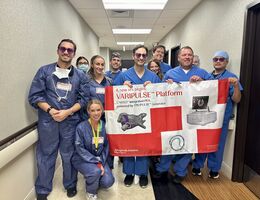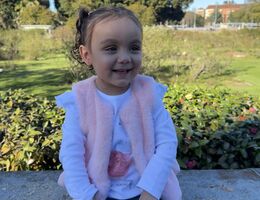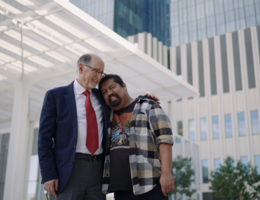
Jessica Guzman, the first patient to undergo hybrid inappropriate sinus tachycardia ablation at LLUH, felt her quality of life drastically improve after the procedure, enabling her to travel to Nicaragua where she reunited with her brother.
Loma Linda University Health began performing a procedure that provides new options for patients with Inappropriate Sinus Tachycardia (IST) — a cardiac condition that is difficult to treat. Patients who have exhausted the usual treatment options may consider undergoing a hybrid IST ablation procedure to treat their elevated heart rate.
People with IST have a resting heart rate that rises above the normal upper limit and can cause palpitations, generalized weakness, dizziness, tremors, exercise intolerance, and loss of consciousness. Medications alone often do not entirely resolve these problems, says Joshua S. Chung, MD, FACS, chair of the Department of Cardiothoracic Surgery at Loma Linda University Health.
“These symptoms can be debilitating, and it’s easy for patients to feel hopeless," he says. "So when patients learn there may be a new solution for their type of arrhythmia, they tend to be highly receptive because they want their life changed.”
Difficult-to-treat IST patients who have undergone the conventional technique — sinus node modification with radiofrequency ablation — faced high rates of complications, says Jalaj Garg, MD, FACC, FESC, a cardiac electrophysiologist at Loma Linda University International Heart Institute. He adds that they may require multiple redo procedures to eliminate the underlying problem completely.
Garg, who has had experience with the newer hybrid IST ablation technique, contributed to published research demonstrating higher success and lower complication rates than the conventional intervention technique.
Jessica Guzman, 47, who’d lived with IST for six years, says she was eager to undergo the hybrid ablation that Garg offered. Although she had tried different prescribed medications over the years, her IST only worsened. Her resting heart rate reached an all-time high of 160 beats per minute (100 bpm marks the upper limit of a normal resting heart rate), significantly impacting her quality of life. Between the palpitations, generalized weakness, and shortness of breath, Guzman says she could barely function.
Now I can do all these things without anything holding me back.Jessica Guzman
She underwent hybrid ablation in August 2023, marking the first such procedure performed in Southern California and its neighboring states. During the procedure, Chung and Garg collaborated to abate Guzman’s abnormal heart rhythm and allow her heart to sustain a lower resting heart rate.
Garg first employed specialized techniques to map out the heart's electrical pathways and pinpoint the precise location responsible for the abnormal rhythm within the heart's electrical system. Next, Chung operated on the heart using minimally invasive approaches to modify specific heart structures, ensuring that the electrical impulses followed the desired path and maintained a regular rhythm. This adds an extra layer of protection to the heart's electrical system, reducing the chances of future tachycardia issues.
Several months post-procedure, Guzman says she hasn’t experienced any issues with her heart rate, and her life has completely changed for the better.
“It was just awesome that the surgery made me feel like a brand-new person immediately,” she says. “My heart rate went down to the 70s and 80s. Now I can do all these things without anything holding me back.”
She just returned from a trip to her homeland of Nicaragua — visiting family and sightseeing — and enjoys morning walks with her new puppy.
“We were thrilled to help Jessica using this newly available option,” says Garg. “We’re looking forward to continuing to offer this treatment to many more patients.”
Loma Linda University International Heart Institute care teams are committed to providing patients with compassionate, comprehensive, and personalized cardiovascular care. To learn more, please visit lluh.org/heart-vascular or call 1-800-468-5432 to make an appointment.


